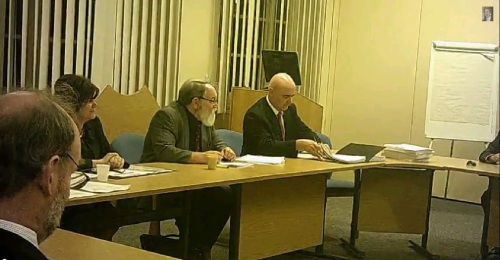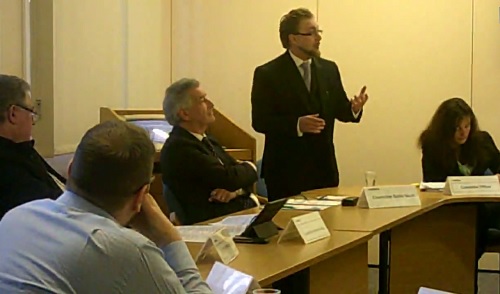Wirral Council in numbers: 3 senior managers leaving, 2 buildings fall down and 2 public meetings cancelled

Please accept YouTube cookies to play this video. By accepting you will be accessing content from YouTube, a service provided by an external third party.
If you accept this notice, your choice will be saved and the page will refresh.
VIDEO ONLY
Please accept YouTube cookies to play this video. By accepting you will be accessing content from YouTube, a service provided by an external third party.
If you accept this notice, your choice will be saved and the page will refresh.
AUDIO ONLY
You can watch the meeting of the Employment and Appointments Committee of 27th October 2014 above at which the Employment and Appointment Panels referred to below were created.
As there is so much happening at Wirral Council now, I thought it was best to write a general piece about a few different topics at Wirral Council.
The public meeting of the Coordinating Committee last week which met to decide a call in of the decision to consult on closure of Children’s Centres was unexpectedly brought to a halt and adjourned (without yet reaching a decision or hearing all witnesses) as the Wallasey Town Hall was evacuated due to the collapse of two Council-owned buildings in nearby King Street.
This story has been widely covered by the media. The main road outside where the building collapsed was closed that evening (but has since been reopened). As I was nearby that evening, I can say that there was a large emergency services response (Merseyside Police, Merseyside Fire and Rescue Service and North West Ambulance Service) and also organisations such as National Grid responded to cut off the gas supply.
As Wirral Council owned the properties that fell down, questions were asked by politicians and the press as to why the buildings fell down. However I will leave that story for now and move to other matters.
Two public meetings that should have happened in the next week at Wirral Council have been cancelled. These are:
19th November 2014 5.30pm Licensing Act 2003 Committee, Committee Room 1, Wallasey Town Hall (contact: Anne Beauchamp | Chair: Cllr Bill Davies (Labour)
24th November 2014 6.00pm Standards and Constitutional Oversight Committee, Committee Room 1, Wallasey Town Hall (contact: Shirley Hudspeth | Chair: Cllr Bill Davies (Labour))
Presumably standards are now so high at Wirral Council that there can be a budget saving achieved from councillors travel expenses, employee costs and the room hire for the cancelled Standards and Constitutional Oversight Committee not meeting. The Licensing Act 2003 Committee’s remit is not unsurprisingly to do with the Licensing Act 2003 c.17. As everyone on Wirral knows, there are no problems whatsoever with pubs, clubs, off licences, late night refreshment or other related activities on the Wirral. Wait a sec, news just in. Seems there is a problem (according to residents). Here’s a question submitted by one of the Oxton residents to the Birkenhead Constituency Committee meeting of 30th October 2014:
“Name: Alfred Lennon (Oxton Village People)
Date Received: 23rd October 2014
Query: Wirral has a problem with alcohol as detailed it its Joint Strategic Needs Assessment and requiring the recent police crackdown. Yet the Authority persists in licensing ever more premises with ever longer drinking hours. Why cannot the Authority be brave, reduce the number of licensed premises AND reduce their opening hours?
Response from Wirral Council Licensing Section:
The Licensing Application Process
When a Licensing Authority received an application for a new premises licence or an application to vary an existing premises licence, it must determine whether the application has been made in accordance with section 17 of the Licensing Act 2003 (the Act), and in accordance with regulations made under sections 17(3) to (6), 34, 42, 65 and 55 of the Act. This means that the Licensing Authority must consider among other things whether the application has been properly advertised. These requirements are different to those connected to the Planning process.
Under the licensing regime an applicant is required to display a blue notice on the premises and publish a notice in a local newspaper providing details of the application. The applicant must also serve the application on the Responsible Authorities which are: the Police, the Fire Authority, Trading Standards, Environmental Health, Planning, the Area Child Protection Board, the Licensing Authority and Public Health who are all entitled to make representations. In addition to this, the Council published details of all application on the Council’s website and circulates these details to all Councillors. Representations can also be made by any person, which can include residents and businesses whom may be affected by a premises.
The Licensing Authority may only accept relevant representations. A representation is “relevant” if it relates to the likely effect of the grant of the licence on the promotion of at least one of the four licensing objectives. In other words, representations should relate to how the licensable activities carried on from premises impact on the objectives. For representations in relations to variations to be relevant, they should be confined to the subject matter of the variation.
Four Licensing Objectives:
- The Protection of Children from Harm
- The Prevention of Crime and Disorder
- The Prevention of Public Nuisance
- Public Safety
”
Wirral Council’s question then goes on for a further A4 side on Cumulative Impact. Just commenting on their answer for a moment to this point from what I remember of current policy (I may be a little rusty so don’t rely on this), as a general rule (*which depends on the circumstances of the application) if there are objections to a new premises licence or application to vary a premises licence it gets decided at a public meeting of the Licensing Act 2003 subcommittee by 3 councillors.
A certain amount of other applications don’t get this scrutiny and are either decided by officers (based on a policy agreed by councillors). What’s left out of the answer is that anyone can request a licence review (if you have the time, paper and postage to do this) which results in an existing licence being reviewed.
This doesn’t happen very often (rarely is what I’d say) as either most people don’t know they can do this, or don’t want to or they don’t know how. I doubt it would be in Wirral Council’s financial interests to tell people how as it would lead to more public meetings of the Licensing Act 2003 subcommittee and then they’d have to put up the fees charged to those running premises as it costs Wirral Council £thousands (room hire, councillors travel expenses, employee time, website running costs, printing of agenda/reports, postage et cetera) each time they hold a public meeting.
However moving on from employee time to an employee leaving. On 31st December 2014 Graham Burgess (the Chief Executive leaves). There isn’t time to appoint a new Chief Executive to start on 1st January 2015 as the post hasn’t even been advertised yet.
The Chief Executive is also Wirral Council’s Head of Paid Service, Returning Officer and Electoral Registration Officer.
So before a new Chief Executive is appointed who will fill these important roles (the latter two especially important because there is an election for Wirral’s 4 MPs and 22 councillors in May 2015). The Head of Paid Service, Returning Officer and Electoral Registration Officer role are all ones Wirral Council is under a legal obligation to have someone in post for. However the decisions have to be made by Council (a meeting of Wirral Council’s councillors) before 31st December 2014.
In addition to Graham Burgess leaving on the 31st December 2014, so is Vivienne Quayle (currently Director of Resources and s.151 officer).
So these are the interim management arrangements currently down to be discussed which will then (assuming the Employment and Appointments Panel approve them) be a recommendation to Council which meets on the 8th December 2014 (this report has a typographical error and states 8th December 2015 by mistake) to decide on an Acting Chief Executive and Acting Head of Paid Service.
Also Council on the 8th December 2015 will need to appoint a Returning Officer and Electoral Registration Officer.
These are the following recommendations (subject to Employment and Appointments Panel agreement and Council agreement on the 8th December 2014):
Returning Officer: Surjit Tour (Head of Legal and Member Services)
Deputy Returning Officer: Joe Blott (Strategic Director of Transformation and Resources)
Acting Electoral Registration Officer: Surjit Tour (Head of Legal and Member Services)
Acting Deputy Electoral Registration Officer: Joe Blott (Strategic Director of Transformation and Resources)
Acting Chief Executive and Head of Paid Service: recommendation to be made by appointment panel on 24th November 2014 to Council meeting on the 8th December 2014
Due to Vivienne Quayle leaving, these are the proposed interim management arrangements recommended to the Employment and Appointments Panel who then have a choice whether to recommend these to Council regarding Ms Quayle leaving:
Acting Section 151 Officer: Tom Sault (Head of Financial Services) regraded from HS2 (now not the proposed railway but a salary grade at Wirral Council) to HS1 for interim period
Acting Deputy Section 151 Officer: Jenny Spick (Finance Manager)
Acting Senior Information Risk Owner (SIRO) (recommendation to Council): Mike Zammit (Chief Information Officer)
Audit function and Procurement function (functional responsibility in Resources division): Tom Sault
There is also a third member of the senior management team leaving too, but arrangements won’t be decided on that until a meeting on the 10th December 2014. That person leaving is Emma Taylor (Head of Specialist Services) in the Families and Wellbeing Directorate. Emma Taylor leaves in December 2014 and the responsibilities of the Head of Specialist Services post are children’s social work, fostering, adoption and children in care.
Helping Wirral Council with the above are Penna PLC (for which they are being paid £15,000 for each post so £45,000 in total) and the Local Government Association.
The seven councillors who will be making the above recommendations to Council in the near future are the seven on the Employment and Appointments Panel who are:
Cllr Phil Davies (Labour)
Cllr Ann McLachlan (Labour)
Cllr George Davies (Labour)
Cllr Adrian Jones (Labour)
Cllr Jeff Green (Conservative)
Cllr Lesley Rennie (Conservative)
Cllr Phil Gilchrist (Lib Dem)
If you click on any of these buttons below, you’ll be doing me a favour by sharing this article with other people. Thanks:
